#siddharth kara
Text
A newspaper in my country has interviewed Siddharth Kara, one of the experts on what's going on in the cobalt mines in Congo. I think it's very well explained and a must-read to get an overview of this huge human rights violation that is going on. So here I translate it to English, hoping it will reach more people.
Siddharth Kara: "Every time we buy a new mobile phone, we put our foot around the neck of a child in the Congo"
Interview with the author of Cobalt Red: How the Blood of the Congo Powers Our Lives
"The poorest people in the world, including tens of thousands of children, dig the earth in toxic and very dangerous conditions to find cobalt," says journalist and writer Siddharth Kara (Knoxville, Tennessee, USA, 1974). The rechargeable batteries of our mobile phones, tablets, laptops or electric vehicles need this mineral that thousands of children, men, women and elderly people extract from the Congolese mines in inhumane conditions. Kara went there because he had specialized in research on slavery, and in Congo he found a modernized form of slavery. "Time has passed, but the colonial mentality has not," he explains. Everything he saw there and what was explained to him is recounted in Cobalt Red: How the Blood of the Congo Powers Our Lives (a book that does not have a translation into Catalan, but which has now been translated into Spanish, by Capitán Swing). The photographs and videos illustrating this interview were taken by himself.
—Was it difficult to write this book?
—Yes. Firstly, because of the specific difficulty of this area of the Congo: very dangerous, very militarized. There are armed militias. And for the local people there it is dangerous to talk to foreigners, because it can bring them consequences. It was difficult to get there, and then it was difficult to build trust with the people who worked there. I only managed it thanks to this trust, which we achieved little by little, until we were sure that we could do the research with guarantees and ethically.
—What drove you to the Congo cobalt mines?
—I had been doing research on slavery since 2000. Around 2016, some African colleagues contacted me and said: “Siddharth, something terrible is happening in the cobalt mines of the Congo, maybe you should go there”. I had no idea what cobalt was. I thought it was a color used for painting. I didn't know it was used for rechargeable batteries. It took me a couple of years to grasp its importance. Then I started making contacts to travel there, and in the summer of 2018 I went there.
—And what did you find there?
—The suffering and degradation I saw there were so intense that I decided to return there often to write a book. Hundreds of thousands of the world's poorest people, including tens of thousands of children, dig the earth in toxic and very dangerous conditions to find cobalt and put it into circulation, in a distribution chain that goes to the rechargeable devices and cars that people like you and me use every day. It was a human apocalypse, a total invasion of human rights and the dignity of the Congolese people.
—Could you describe what a mine like this is like, physically? How should we imagine it?
—Those who are at the top of the economic chain of cobalt exploitation like to distort the truth, and use the term "artisanal mine". This way, they evoke a kind of picturesque activity, but on the ground it is a dangerous and degrading job. A mine of this kind is a mass of tunnels, pits and trenches filled with thousands of people who dig with shovels, pieces of metal or directly with their bare hands. They fill a sack with earth, stone and mud. Some children rinse it in toxic pools to separate the mud from the cobalt stones, which a whole family pours into another sack. It might take twelve hours to fill a forty-kilo sack or two. For each sack they get paid a few euros, very few, and that's how they live every day. They survive.
This video was filmed by Siddharth Kara: [you can watch the video in the interview link, freely available without any paywall, here]
—Is there any rational organization in these mines? Is there someone who decides who does what to optimize work?
—Well, there is a whole gear designed so that the poor and the children of the Congo produce hundreds of thousands of tons of cobalt every year. There, work is usually divided by age and gender. Digging tunnels, which requires a lot of strength, is usually done by young men and teenagers. The digging of small pits and trenches that can be less meters deep is done by women and smaller children. Rinsing this toxic cobalt is usually done by the children. The merchant system to exploit these families and sell the cobalt they produce to the formal industrial mines is very well set up.
—What else do these people at the top of the chain invent?
—Another fiction they invent is that there is a difference between industrial and artisanal mining, and that they only buy from the industrial one, where there is no child labor. Not true: all cobalt is mined by children. All the cobalt that the children and peasants extract goes straight to industrial mining. In addition, there is no way to separate what comes from a bulldozer and what comes from a child, once it all pours into the same place in the facility that does the industrial processing before this cobalt is sent out of the Congo.
—You explain that the situation is particularly abusive for women.
—Yes. It is a lawless land, and violence is the norm. Women and girls always bear the brunt: they are victims of physical and sexual violence, and almost no one talks about it. It is a major tragedy: they are victims of sexual assaults that are committed in the mines themselves, while they collect the cobalt that we have in our mobile phones.
—You refer to all of this as a new episode of slavery. It is not the first time that the Congo has a decisive material for Western economic development. It happened with uranium for nuclear bombs, for example. History repeats itself.
—Exactly. It is important for people to understand that we are not witnessing an isolated case, but the latest episode in a long, very long, history of looting of the Congo, a very resource-rich country, dating back to the colonial period. The first automobile revolution required rubber for tires. The Congo had one of the largest rubber tree rainforests in the world. King Leopold [of Belgium] deployed a mercenary army of criminals and terrorists to enslave the population and make them work to get it. This inspired Joseph Conrad's novel Heart of Darkness. The Congo also has abundant reserves of gold, diamonds, nickel, lithium and other metals and minerals that make components for electronic devices…
—These mercenaries deployed by King Leopold, are they still there today, in one way or another?
—Yes. On the ground there are militias, or the army, or private security forces that the mining companies hire and that, sometimes, in addition to monitoring, do the work of recruiting children. Under the threat of an occupation, they force an entire town to dig. It's atrocious: we live in an age of supposed moral progress, where everyone shares the same human rights, and yet our global economic order has its knee on the necks of the children and the poor of the Congo, with this huge demand for cobalt that has to fuel the rechargeable economy.
—Has no Western country or international body done anything to stop it?
—No. No western country, no government, no big business has lifted a finger to address this tragedy. They talk about maintaining human rights standards in their supply chains, they talk about environmental sustainability, but it's only talk. That is why it is very important that journalists and researchers set foot on the land of the Congo and listen to what the Congolese have to say: that no one protects their rights or their dignity, that they are erasing the environment, that mining it is not done in a sustainable way and the whole countryside is polluted and destroyed by the mining operations. It is enough to walk ten minutes around a mine to see it.
—Does the same happen in all mines? Large Western companies that use cobalt often claim that theirs comes from artisanal mines that meet standards.
—Have they gone there? There is no decent mine in the Congo. It does not exist. I'll be happy to take any CEO of any tech company to their mines, where their cobalt comes from. We'll stand there, watching them extract it, and take a selfie with it. Everyone will realize that what is seen behind us is not decent. You will see destruction, millions of trees felled, installations that emit toxic gases that fall on the surrounding towns, on the children, on the animals, on the food. There is no decent mine in the Congo. And they know it. But who will believe the voice of a Congolese if they can drown it out with proclamations of human rights while they continue to make money without measure?
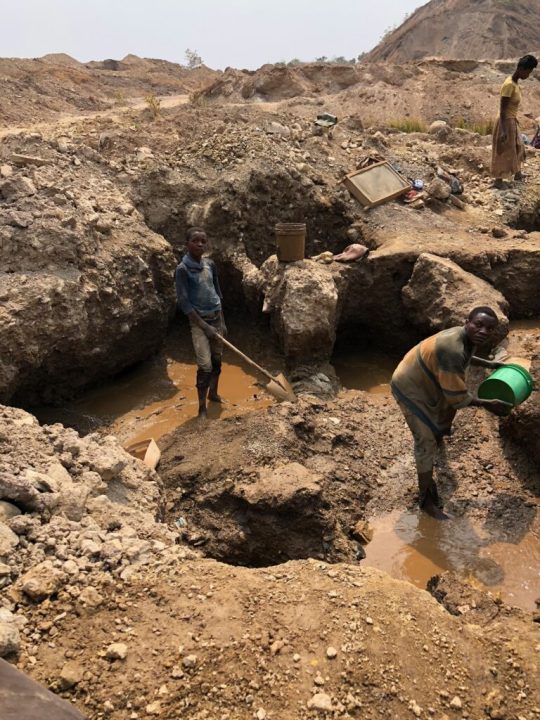


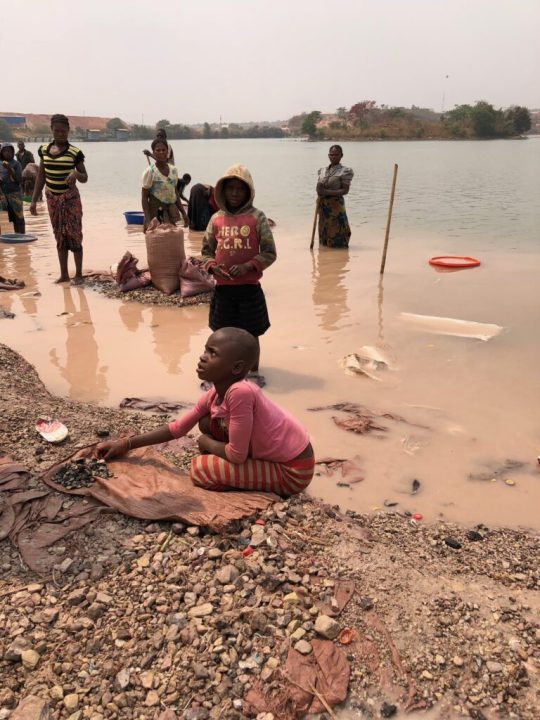
—Can you explain the role China plays in all of this? You say that it controls the supply chain.
—Yes. China controls about 70% of mining production in the Congo. Why do we accept China saying its mines are decent, if they don't even protect the human rights of their own people? Why do we accept a technology company or a car manufacturer saying, "My Chinese partners say they protect human rights there, and that's enough for me"? Why do we accept it?
—Why do you say that a certain transition to green energy is absolute hypocrisy?
—When the calls in favor of this transition consist of proposing to consumers that they buy electric vehicles instead of gasoline cars, this is hypocrisy. Because the cobalt and other elements that are used for the batteries of these cars are extracted using methods that are catastrophic for the environment. While in one part of the world we say we want to save the environment and leave a greener planet to our children, in another we are destroying both the planet and the future of their children. How can you save only part of the planet, turning the rest into a toxic dump? How can we give a green planet only to our children, while we let other people's children die? This is hypocritical.
—It is a reflection of the domination that the global north maintains over the south.
—We have never given Congo the opportunity to benefit from its own resources. It is a colonial mentality: time has passed, but the colonial mentality has not. It is the same type of colonial plunder from a century and a half ago. It is colonial to say: "Look, we need this, they have it, we take it from them in any way and, when we no longer need it, we leave a catastrophe behind us". There are companies that, recently, have started to pretend that they are becoming aware of this and promised that they would try to use batteries that did not have cobalt, but in reality they said: "Well, we've been caught, we'll look for another mechanism". And they do nothing to solve the catastrophe. Even if we no longer needed cobalt tomorrow, we would have to repair the destruction we have caused these past fifteen years.
—It's the big companies who should be required to react, but what do you think a Western consumer who has gotten upset reading you could do?
—The first step to progress in the conquest of human rights is always to make injustice known. Contribute to make everyone knows. Most people are good and, in their hearts, want no part of injustice. It is the few who move based on avarice and greed who pollute the rest of humanity. Outreach and awareness is the first step because it will inevitably activate a lot of people. Change always starts like this. In the case of cobalt, the second step is to think about our consumption habits. Every twelve months, the technology company I bought my phone from offers me a new one. Do I really need it? Every time we buy a new mobile phone, we put our foot on the neck of a child in the Congo. Better think twice, then.
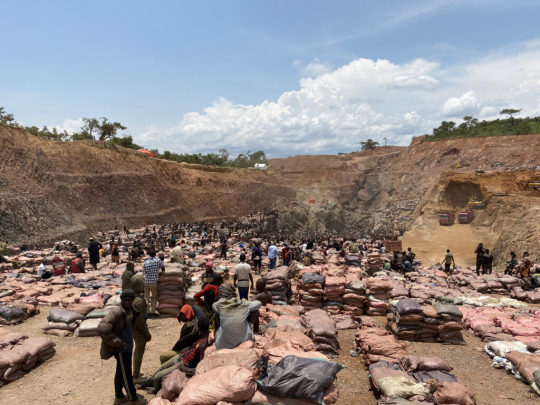
#congo#human rights#electric vehicles#electric cars#colonialism#labour rights#china#environmentalism#rape culture#feminism#slavery#africa#cobalt#labor rights#anti racism#free congo#siddharth kara#childrens rights#history#💬
178 notes
·
View notes
Text
I don't like how people are talking about African liberation struggle. A lot of social media posts about the Democratic Republic of the Congo are getting less and less humanizing and the Congolese creators putting in the work to draw attention to their liberation struggle are not seeing people actually engage with them at the level of ontology, meaning that for a number of reasons, most of them to do with misogynoir, Congolese creators are being dehumanized by a voyeuristic social media audience who is more interested in bearing witness to suffering than doing much about it. While I'm not surprised (this is something that is well known territory for Black liberation struggles) it is deeply depressing and frankly unsettling to see how much harder the route to ontology, let alone empathy, is for Black people globally if we rely on the spectacle of our subjugation. I'm going to have to finish Necropolitics by Achille Mbembe before I look at Cobalt Red, and I may continue to delay Cobalt Red if I can find a book by a congolese author that covers the impact of the mining industry there. I don't know if there's anything I should hold against Siddharth Kara personally but I admit to a frustration that the only book recommended to read in English about the DRC, at least on social media, is written by a nonblack person.
#democratic republic of the congo#cobalt red#siddharth kara#we all have much to unpack about how ee engage with African suffering and African liberation
15 notes
·
View notes
Text

"My investigations in the DRC were only made possible with the assistance of several guides and translators who were trusted in local communities. These guides assisted me in gaining access to scores of mining sites, as well as the people who toiled at them. Every one of the guides who worked with me did so at considerable personal risk. The Congolese government has historically gone to great lengths to obscure conditions in the mining provinces. Anyone seeking to expose the realities, such as journalists, NGO workers, researchers, or foreign news media, is heavily monitored during their stay. The Congolese military and other security forces are omnipresent in mining areas, making access to mining sites dangerous and at times impossible. Perceived troublemakers can be arrested, tortured, or worse. Out of an abundance of caution, I have used pseudonyms for my guides and the brave individuals whose testimonies are included in this book. I have also limited any personal descriptions or information that could be used to identify these individuals, as such information would place them and their families in jeopardy." - excerpt from "Cobalt Red: How the Blood of the Congo Powers Our Lives" by Siddharth Kara
Why you don't hear much information coming out of the Congo about the people suffering there.
6 notes
·
View notes
Text
im still in the middle of Medical Apartheid and Cobalt Red just came off hold but then I remembered that All This Twisted Glory (This Woven Kingdom #3) comes out next week on Feb 6th and now I’m re-reading the first two because I loved them so much they really hit my need for a fantasy with an interesting plot plus a good romance and it’s by the same author who wrote Shatter Me so if you liked that series I highly recommend it because the main character is so Juliette coded and the writing is so beautiful with funny and quippy dialogue but their speech pattern is Victorian so it’s like a Cinderella/regency romance in a Persian inspired setting with djinn and magic so anyway this is about to be a Tahereh Mafi account for the next two weeks
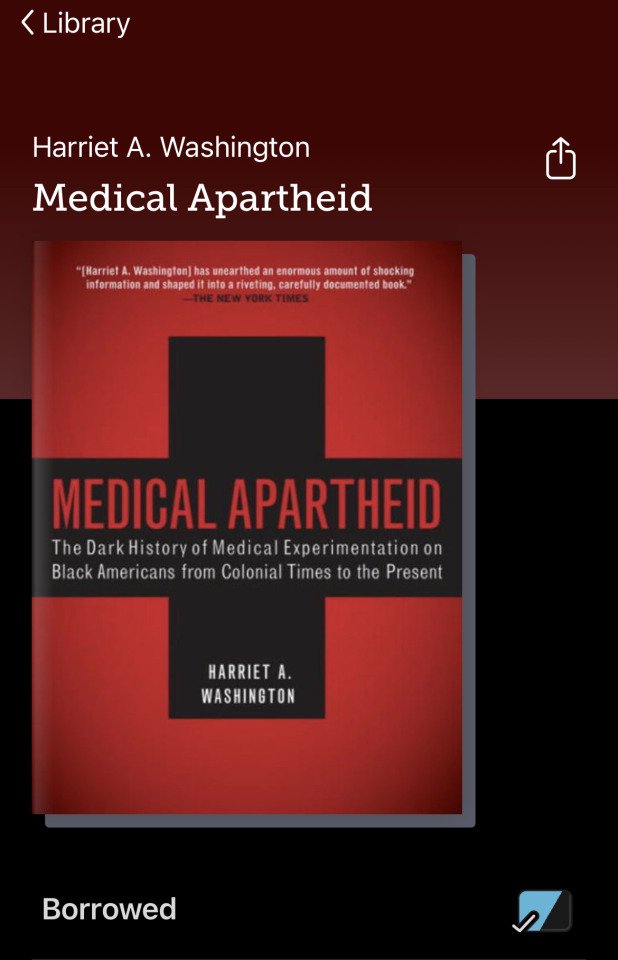



but also I feel a little bit like

#medical apartheid#harriet a washington#harriet washington#cobalt red#siddharth kara#all this twisted glory#this woven kingdom#these infinite threads#tahereh mafi#alizeh#cyrus#kamran#alizehcyrus#juliette ferrars#warnette#bookblr#ya fantasy#reading#shatter me#obviously I had cobalt red get delivered later so someone else could read it
2 notes
·
View notes
Text
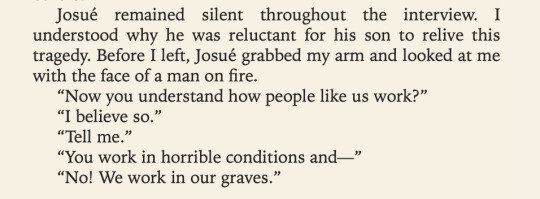
1 note
·
View note
Text
Brano tratto da "Rosso cobalto. Come il sangue del Congo alimenta le nostre vite", di Siddharth Kara :
Una delle interviste più istruttive che ho condotto è stata con un ragazzo di sedici anni dalla parlata pacata di nome Phelix. Phelix aveva iniziato a scavare a Tilwezembe nel 2015. Era il penultimo di sette figli e uno dei tre fratelli che avevano scavato nella miniera. Suo padre era morto quando lui aveva undici anni, lasciando sua madre a crescere tutti e sette i figli da sola. Phelix aveva una spessa cicatrice lungo il lato destro della testa, su cui mancavano i capelli. Disse che la cicatrice era stata causata da una grossa roccia cadutagli sulla testa mentre lavorava a Tilwezembe. Dopo essersi ripreso a casa, era tornato a lavorare perché la famiglia aveva bisogno di ogni dollaro che i bambini potevano guadagnare. Phelix disse che usciva di casa per lavorare a Tilwezembe all’alba ogni mattina, e di solito tornava a casa al tramonto. Riferiva stanchezza cronica e soffriva di una tosse fastidiosa. Due delle dita della sua mano sinistra erano rotte e permanentemente storte all’altezza delle nocche centrali.
Ecco come Phelix descriveva il sistema della miniera: «Devi capire che CMKK e COMIKU controllano la maggior parte dei creuseurs di Tilwezembe. Le cooperative operano su diverse parti della concessione. Io lavoro nell’area della CMKK. Ci sono anche capi indipendenti che pagano CMKK o COMIKU per sfruttare altre parti della concessione. Non sono iscritto alla CMKK perché per avere la carte d’enregistrement devi avere diciotto anni. I creuseurs come me, che non sono registrati, devono pagare una quota giornaliera di duecento franchi congolesi [circa 0,11 dollari] alle cooperative per scavare a Tilwezembe. Ci sono funzionari di SAESSCAM che vengono sul posto. Ogni volta che li vediamo, diventiamo ansiosi perché sappiamo che troveranno un modo per prenderci dei soldi. Lavoriamo in gruppi in diverse aree della miniera. Io sono in un gruppo di venti ragazzi. I più giovani scavano nelle fosse. I più grandi scavano nei tunnel… Tutto quello che scaviamo lo vendiamo ai capi. I capi sono cinesi ma anche congolesi e libanesi… Il capo controlla il mio lavoro in miniera. Ci dice dove scavare e ci paga. Se non lo ascoltiamo, dirà ai soldati di punirci. Non importa quanto lavoriamo, non guadagniamo mai più di quattromila franchi congolesi [circa 2,20 dollari]. Dopo che il mio capo ha acquistato il cobalto, lo vende alla CMKK. Hanno un camion in concessione. Carichiamo i sacchi su questo camion».
CMKK e COMIKU sono le due più grandi cooperative minerarie artigianali nella provincia di Lualaba. COMIKU è di proprietà di Yves Muyej, uno dei figli del primo governatore della provincia di Lualaba, Richard Muyej. I Muyej sono fedeli alleati di Joseph Kabila e, come lui, hanno forti legami con le compagnie minerarie cinesi. CMKK è di proprietà di funzionari della cerchia ristretta di Joseph Kabila, ed è stata originariamente fondata dal colonnello Ilunga, ora defunto. Il rame-cobalto venduto lungo la catena da CMKK e COMIKU dovrebbe includere l’assicurazione del fatto che i minatori artigianali ricevano salari ragionevoli, attrezzature di sicurezza e assistenza medica in caso di infortunio. Il minerale dovrebbe anche arrivare con la garanzia che non sono stati coinvolti bambini nell’estrazione e che solo i minatori artigianali registrati e approvati da CMKK e COMIKU lavorano nel sito.
[...] I minatori di Tilwezembe descrissero condizioni pericolose e dure rappresaglie se non obbedivano ai loro capi. Alcuni erano stati rinchiusi all’interno di un container chiamato cachot (‘le segrete’) senza cibo né acqua per un massimo di due giorni.
Da una serie di testimonianze, l’economia del sistema minerario artigianale di Tilwezembe sembrava funzionare nel modo seguente: se un capo pagava ai bambini che lavoravano per lui circa 1,10 dollari per sacco di heterogenite, che pesava trenta chilogrammi, vendeva ogni sacco alle cooperative per 7 o 8 dollari, facendo circa 6 o 7 dollari di profitto per sacco. Da questo momento in poi, la catena del valore diventava oscura, poiché c’era pochissima trasparenza sul prezzo del cobalto lungo la catena fino a quando non raggiungeva il London Metal Exchange (LME), che fissa il prezzo di mercato globale per il cobalto completamente raffinato.
Quello che sono riuscito a mettere insieme è che la maggior parte delle cooperative minerarie (e dei depositi) in media vendeva minerale con un grado di cobalto del due o tre per cento a società minerarie industriali nella RDC a un prezzo che era circa il 15-20 percento del prezzo di cobalto raffinato sul LME. Quindi, se un chilogrammo di cobalto raffinato sul LME fosse venduto a 60 dollari, allora le cooperative venderebbero il minerale contenente cobalto a 9-12 dollari al chilogrammo. Tenendo presente che probabilmente avevano acquistato trenta chilogrammi di detto minerale per 8 dollari, le cooperative emergevano nel sistema come imprese generatrici di enormi profitti. Questi profitti finivano in gran parte nelle tasche dei loro proprietari, che tendevano a essere dirigenti d’azienda o funzionari governativi.
#Rosso cobalto. Come il sangue del Congo alimenta le nostre vite#archivio#rdc#congo#rosso cobalto#siddharth kara
0 notes
Text
The Shanghai Auto Exposition 2023 and The Ethics of Cobalt
With the beginning of this year’s Shanghai auto exposition in 2023, the predominant cars and other vehicles on offer have mainly been electric vehicles (EV) and hybrid vehicles, which mainly use cobalt to create electric batteries that run the vehicle.
With the beginning of this year’s Shanghai auto exposition in 2023, the predominant cars and other vehicles on offer have mainly been electric vehicles (EV) and hybrid vehicles, which mainly use cobalt to create electric batteries that run the vehicle.
In the exposition, car companies presenting their new vehicles, such as BMW and Nissan showcasing new vehicles, particularly electric and hybrid…
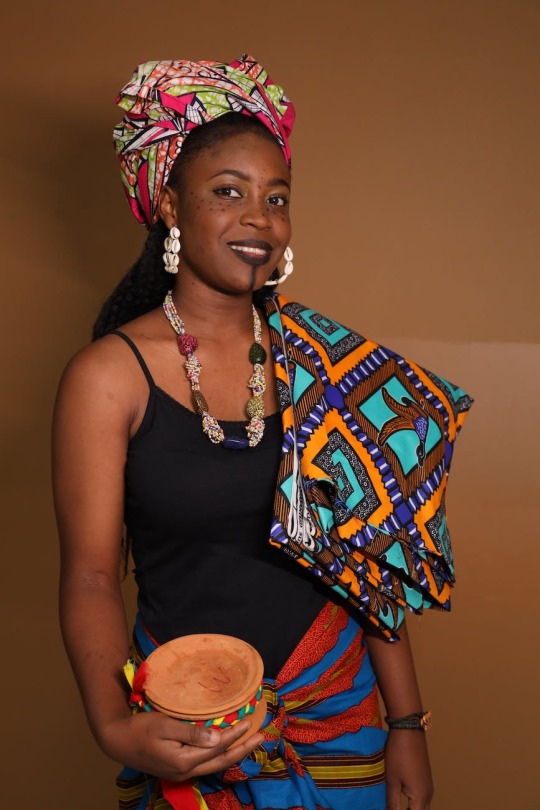
View On WordPress
#BMW#Cobalt#Cobalt Red How the Blood of the Congo Powers Our Lives#Ethics#Ethics of Cobalt#Joe Rogan#Joe Rogan Experience Podcast#Leopold II of Belgium#Nissan#Shanghai Auto Exposition#Siddharth Kara#Zambia
0 notes
Video
youtube
‘Cobalt Red: How the Blood of the Congo Powers Our Lives’ w/ Siddharth Kara
From smartphones to electric vehicles, all lithium-ion rechargeable batteries made today require cobalt, a unique mineral that is almost exclusively mined in the Democratic Republic of the Congo.
Siddharth Kara, author of Cobalt Red: How the Blood of the Congo Powers Our Lives, joins the show to explain the immense toll taken on the people and environment of the Democratic Republic of the Congo by cobalt mining and the numerous layers of multinational supply chains that serve to erode accountability for the absolute exploitation for absolute profit.
#congo#lithium mining#cobalt mining#2023 slavery#eco nightmare#tesla#iphone#cellphone batteries#DRC#mutinational theft#elon musk#‘Cobalt Red: How the Blood of the Congo Powers Our Lives’ w/ Siddharth Kara
5 notes
·
View notes
Text
just found out about these things called audiobooks....... very cool
0 notes
Text

#i hate this world#everything feels so hopeless right now#free congo#cobalt red by siddharth kara#book rec
1 note
·
View note
Text
youtube
Here are a few articles and interviews talking about the violence in Eastern DRC, feel free to add any other resources you know.
20 notes
·
View notes
Text

From "Cobalt Red: How the Blood of the Congo Powers Our Lives" by Siddharth Kara" -
"Throughout much of history, mining operations relied on the exploitation of slaves and poor laborers to excavate ore from dirt. The downtrodden were forced to dig in hazardous conditions with little regard to their safety and for little to no compensation. Today, these laborers are assigned the quaint term artisanal miners, and they toil in a shadowy substrate of the global mining industry called artisanal and small-scale mining (ASM). Do not be fooled by the word artisanal into thinking that ASM involves pleasant mining activities conducted by skilled artisans. Artisanal miners use rudimentary tools and work in hazardous conditions to extract dozens of minerals and precious stones in more than eighty countries across the global south. Because ASM is almost entirely informal, artisanal miners rarely have formal agreements for wages and working conditions. There are usually no avenues to seek assistance for injuries or redress for abuse. Artisanal miners are almost always paid paltry wages on a piece-rate basis and must assume all risks of injury, illness, or death."
The takeaway here is that the more flowery the language is surrounding something mundane, the more suspicious of it you should probably be.
1 note
·
View note
Text
Whats happening in Congo is absolutely vile and the fact that some of you know yet do nothing makes me sick. The condition under which people fo Congo have to work are inhumane, amnesty international has said things like sexual asault, arson and abuse are the norm. Children are being forced to work, every day people are dying. Siddharth Kara, British Academy Global Professor and an associate professor at the University of Nottingham. Has said that they work under slave-like working conditions here are some highlights of the article I read:
"rechargeable batteries are frequently powered by cobalt mined by workers laboring in slave-like conditions in the Democratic Republic of Congo."
"People are working in subhuman, grinding, degrading conditions. They use pickaxes, shovels, stretches of rebar to hack and scrounge at the earth in trenches and pits and tunnels to gather cobalt and feed it up the formal supply chain."
"There's complete cross-contamination between industrial excavator-derived cobalt and cobalt dug by women and children with their bare hands," he says. "Industrial mines, almost all of them, have artisanal miners working, digging in and around them, feeding cobalt into the formal supply chain."
Siddharth Kara has been researching modern day slavery, human trafficking and child labour's for 2 decades, listen to what he si saying about this. This is a violation of human rights, and we as humans should not sit and watch. Speak up.
It is expected that the demand for cobalt is going to go up by 300 Percent, which most likely means even worse working conditions for the people of Congo. Please if your Phone works, don't buy a new one. And use your voice! Speak up about what's happening
artisanal miners= freelance workers who do extremely dangerous labor for the equivalent of just a few dollars a day.
Source:
https://www.nu.nl/economie/6280537/groeiende-vraag-naar-elektrische-autos-leidt-tot-nog-meer-ellende-in-congo.html
(It's in Dutch.)
And
https://www.npr.org/sections/goatsandsoda/2023/02/01/1152893248/red-cobalt-congo-drc-mining-siddharth-kara
Please read the articles, if you don't speak Dutch at least read the second one, it's in English.
#free congo#congo genocide#congo#democratic republic of the congo#modern slavery#slavery#child labor
17 notes
·
View notes
Text
Useful Readings - Palestine, DRC, Disability Justice, Queer Liberation, and More

A list of some useful readings not just on Palestine but also the DRC, Public Health, disability, and queer perspectives on the various genocides that are all interconnected.
Book List in Text Form:
Arab Women's Lives Retold - Exploring Identity Through Writing
Broken - The Failed Promise of Muslim Inclusion - Evelyn Alsultany
Covering Islam - Edward Said
Culture and Imperialism - Edward Said
Orientalism - Edward Said
It Was Vulgar and It Was Beautiful How AIDS Activists Used Art to Fight a Pandemic - Jack Lowery
Killing the Black Body - Race, Reproduction, and the Meaning of Liberty - Dorothy Roberts
Medical Apartheid - the Dark History of Medical Experimentation on Black Americans from Colonial Times to Present - Harriet Washington
The Congo from Leopold to Kabila - Georges Nzongola-Ntalaja
The Hundred Years War on Palestine - Rashid Khalidi
The Right to Maim - Jasbir Puar
The Viral Underclass - Steven Thrasher
Women in African Colonial Histories
Terrorist assemblages - Homonationalism in Queer Times - Jasbir Puar
Palestinian Cinema - Landscape, Trauma and Memory - Nurith Gertz and George Khleifi
Dancing in the Glory of Monsters - The Collapse of the Congo and the Great War of Africa - Jason Stearns
Cobalt Red - How the blood of Congo powers our lives - Siddharth Kara
Modern Slavery - a Global Perspective - Siddharth Kara
Sex trafficking : inside the business of modern slavery -Siddharth Kara
Bonded Labor: Tackling the System of Slavery in South Asia
#free palestine 🇵🇸#free congo#democratic republic of the congo#free gaza#free sudan#disability justice#queer rights#ceasefire
16 notes
·
View notes
Text
'Cobalt Red' describes the 'horror show' of mining the element in the DRC : Goats and Soda : NPR
13 notes
·
View notes